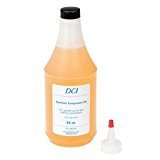
What’s more, atmospheric air usually contains between 0.05 and 0.5 ppm oil vapor – meaning that the complete elimination of oil in product air is nearly impossible. Traditional lubricated compressors offer the same level of filtration as oil-free compressors and, with the right systems in place, can meet air quality regulations across industries – including ISO 8573-1 Class 0 and Class 1 standards for applications requiring instrument air. In general, manufacturers today recommend using either a 20 or 30 weight synthetic lubricant – rather than a mineral oil – to get the best results out of your industrial compressed air system.
Mineral oils are also significantly more reactive than synthetic oils. This type of oil is a higher-quality, premium product that has a longer service life; in fact, synthetic oils can run typically run 50% longer than standard oils. Synthetic oils can also extend the life of your compressor, are consumed at a slower rate, stay cooler than their standard oil counterparts, and also can help in reducing various deposits that negatively impact compressor performance.
The type of oil you use for your air compressor varies on the type of compressor that you have. Below you can find a list of all our Ingersoll Rand lubricants/coolants that work best with our compressors. This type of oil will need to be changed every 2,000 hours or 12 months, depending on which one occurs first.
air compressor oil recommendations Related Question:
What kind of oil should I use in my air compressor?
The Clear Choice for Lubricated Compressors In general, manufacturers today recommend using either a 20 or 30 weight synthetic lubricant — rather than a mineral oil — to get the best results out of your industrial compressed air system.
Can I use any oil in an air compressor?
Whether standard, synthetic or a substitute, the oil you use must be non-detergent. If your warranty guidelines don’t specify a type of oil, we recommend using a standard 20 weight or 30 weight compressor oil. A 30 weight oil is more viscous and will provide better protection in the warmer months.
Can I use 10W30 in my air compressor?
Can you use 10W30 in your air compressor? No. The recommendation by manufacturers of air compressors and the advice of air compressor experts is to use air compressor oils without detergents. Since 10W30 contains detergents, it should not be used.
Is SAE 30 oil non detergent?
SAE 30 is typically a non detergent motor oil used in small engines. Detergent oils contain special additives designed to trap and suspend dirt and dissolve engine oil sludge in the oil until it’s changed. A non detergent oil doesn’t have these additives.
What is the difference between air compressor oil and motor oil?
Air-compressor oil is usually a synthetic oil that does not contain detergents commonly found in motor oil. Air-compressor oil is manufactured specifically for use in lubricating the ball bearings inside a compressor and is generally the recommended choice by manufacturers of air compressors.
Can I use 2 stroke oil in my compressor?
The use of synthetic oils in an air compressor is possible if they are compatible. They can lubricate the different parts of your pump and motor assembly and handle high temperatures without breaking down as general-purpose oils can.
Why do air compressors use non detergent oil?
It offers better protection of internal pump parts by reducing wear and friction. Synthetic blend oil extends the air compressor pump life, especially during cold weather use.
Is synthetic oil non detergent?
Yes, Synthetic oils have detergents. Synthetic oils and motor oils are good for car or bike engines.
Do air compressors need special oil?
Because compressor oil is used for cooling and sealing, it must be special, high-quality oil and cannot be substituted with alternatives such as motor oil. Essentially, as the oil flows around between the screw elements, it seals the space in which the air is compressed. Another important task is cleaning.
What is the difference between non detergent oil and detergent oil?
Detergent additives are the one that differentiates between a detergent oil and a non-detergent oil. If the engine or motor oil contains detergent additives in it, it is called a detergent oil. If there are no detergent additives added, then the oil is called as non-detergent oil.
Is 10W30 oil non detergent?
NON-DETERGENT 10W30 MOTOR OIL.
Is non detergent 30 the same as SAE 30?
SAE30 engine oil is a “straight-weight” (there is no “W” in the designator) engine oil that is common in small engines and the like. SAE30ND (non-detergent) oil is SAE30 engine oil without the detergents and anti-sludge additives in the additive package.
What is 30W non detergent oil?
SAE 30 Non Detergent Lubricating Oil is a mineral base oil product for use in systems where non detergent oils are specified. SAE 30 Non-Detergent Lubricating Oil is recommended for use in air compressors and hydraulic systems where the use of non-detergent oils is specified.
What is a non detergent motor oil?
Non-Detergent Type Motor Oil is an economy-priced motor oil for non-critical gasoline engines operating under mild conditions which do not require detergent, antiwear, or other protective additives. It is available in SAE 30 grade, and in limited areas, SAE 40.
How do I keep my air compressor tank from rusting?
The most effective way to prevent rust in your air tanks is to drain each tank regularly after every operation. This process helps eliminate the condensation that’s pooled at the bottom of the tank. After draining, leaving the valve open for a couple of hours will allow the inside of the tank to dry out.

